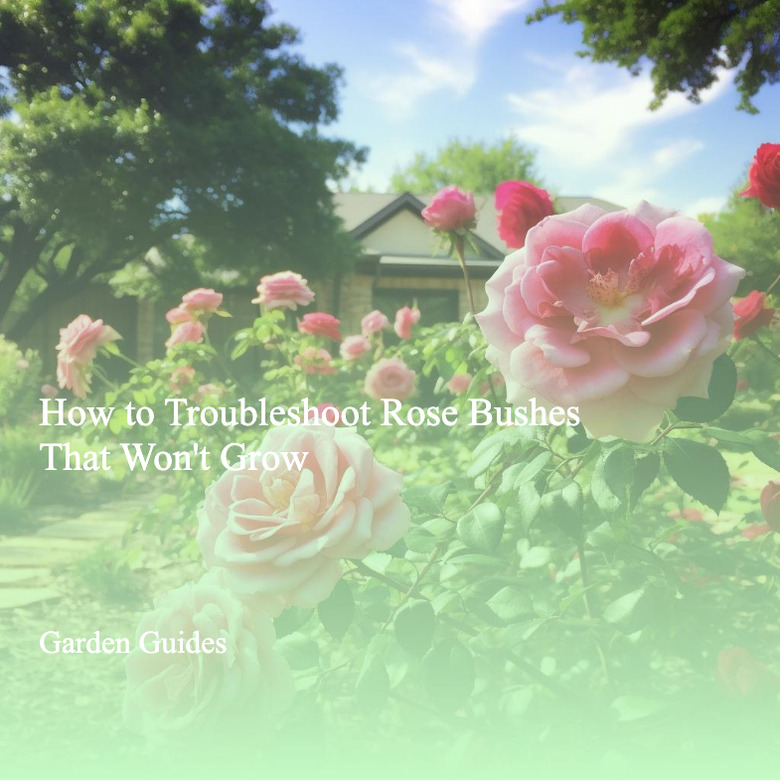How To Troubleshoot Rose Bushes That Won't Grow
Rose bushes that won't grow usually suffer from pest infestations, fungal diseases, too little or too much water, inadequate fertilization, or a less-than-ideal planting location. If your rose bushes aren't growing due to an improper planting site, there's not much else you can do but dig the bushes up and plant them in an appropriate location. For the other potential culprits, there are actions you can take to get your rose bushes healthy and growing again.
Treat Fungal Diseases
Step 1
Troubleshoot powdery mildew infections by applying an appropriate fungicide or spraying the rose bushes with a mixture of 1 tsp. of baking soda, 1/2 tsp. of oil and 1 quart of warm water. Rose bush leaves covered in a white or grayish powder is a tell-tale sign of powdery mildew.
- Rose bushes that won't grow usually suffer from pest infestations, fungal diseases, too little or too much water, inadequate fertilization, or a less-than-ideal planting location.
Step 2
Treat canker by cutting away the diseased stems and canes, and then applying a copper-based fungicide to the rose bushes. Your stunted rose bushes have canker if their woody parts have dead or discolored areas. Avoid fertilizing or pruning your rose bushes while treating canker.
Step 3
Look for black spots covering your rose bushes to diagnose the fungal disease "black spot." Troubleshoot this disease by applying an organic fungicide once per week and keeping the area around the rose bushes free of fallen leaves or other debris.
Step 4
Troubleshoot botrytis by cutting away and discarding diseased parts of the rose bushes and treating the bushes with a micronized sulfur-based fungicide. You'll know whether your rose bushes have botrytis if the flowers refuse to bloom and the buds are shriveled up and grayish-brown in color.
Troubleshoot Over- or Under-Watering & Fertilization Issues
Step 1
Determine whether you're over- or under-watering your rose bushes and causing them to not grow by looking for wilted, yellowed or browning leaves and flowers. If your rose bushes are getting less than 1 or 2 inches of water per week, you're not watering them enough. If your rose bushes are getting far more water, you're over-watering.
- Treat canker by cutting away the diseased stems and canes, and then applying a copper-based fungicide to the rose bushes.
- Troubleshoot botrytis by cutting away and discarding diseased parts of the rose bushes and treating the bushes with a micronized sulfur-based fungicide.
Step 2
Stop watering your rose bushes for about one week, if you've determined that you're over-watering. Or, establish a schedule of watering your rose bushes two to four times every week, soaking the soil to a depth of 12 to 18 inches, if you're under-watering them.
Step 3
Spread a 2- to 3-inch layer of organic mulch around the base of each rose bush to help retain moisture, as well as control weeds.
Step 4
Feed your rose bushes a commercial rose fertilizer in the spring, when the first new leaves appear. Feed your rose bushes again after each blooming, following the dosage instructions on the packaging. Stop fertilizing two months prior to the first expected frost.
Troubleshoot Pest Problems
Step 1
Inspect your rose bushes for holes chewed into the flowers and leaves to determine a Japanese beetle infestation. Treat the rose bushes with an appropriate organic insecticide.
- Stop watering your rose bushes for about one week, if you've determined that you're over-watering.
- Or, establish a schedule of watering your rose bushes two to four times every week, soaking the soil to a depth of 12 to 18 inches, if you're under-watering them.
Step 2
Look for holes bored into the flower buds to diagnose a rose bud borer infestation. Remove the tiny insects along with the infested buds by hand and spray the rose bushes with a mixture of insecticidal soap and pyrethrin.
Step 3
Check for yellowing or dry leaves with white pinhole dots on the undersides of the leaves, which indicate a spider mite infestation. Treat your rose bushes by applying lime sulfur or an appropriate miticide during the dormant season and spraying the rose bushes with a mixture of pyrethrin and insecticidal soap during the growing season.
Step 4
Inspect your rose bushes for oval or round holes on the leaf margins and wilting stems and canes that you pruned recently. This is likely leafcutter bees attacking your rose bushes. Mitigate the problem by pruning away damaged stem tips and sealing the cuts with a grafting wax.
- Look for holes bored into the flower buds to diagnose a rose bud borer infestation.
- Treat your rose bushes by applying lime sulfur or an appropriate miticide during the dormant season and spraying the rose bushes with a mixture of pyrethrin and insecticidal soap during the growing season.
Step 5
Check your rose bushes' leaves for large, jagged or irregular holes chewed into them to diagnose a rose chafer infestation. Pick off the rose chafers by hand and apply an organic insecticide mixed with horticultural oil to the rose bushes.
Tip
If you've ruled out all possible problems and your rose bushes don't display any other symptoms except for not growing, investigate the type of rose bush you have and its mature height. For example, you may think you have a William Baffin rose bush, which grows to a mature height of 8 to 10 feet, when you actually have a Magic Meidiland, which grows to only 2 or 3 feet tall at maturity.
Warning
Beware of overcrowding as a cause for your rose bushes not growing. Your rose bushes should be at least 5 feet apart from each other to allow for adequate space for root growth and good air circulation around the plants.
Things Needed
- Appropriate fungicide or insecticide
- Garden hose or watering can
- Organic mulch
- Commercial rose fertilizer
